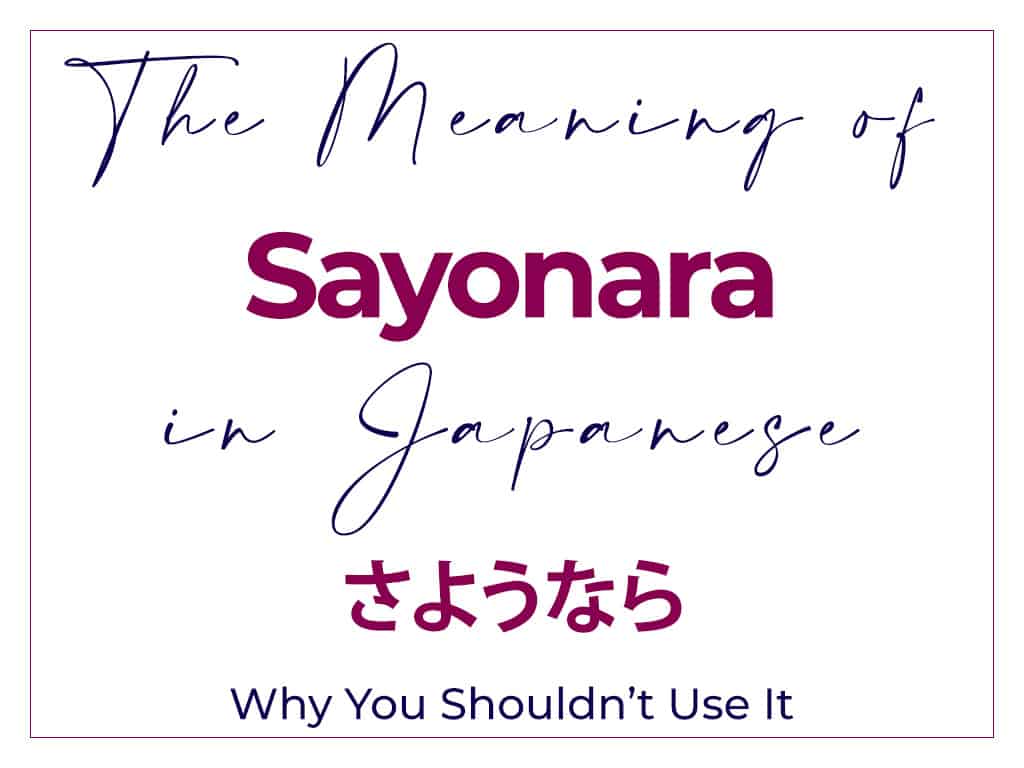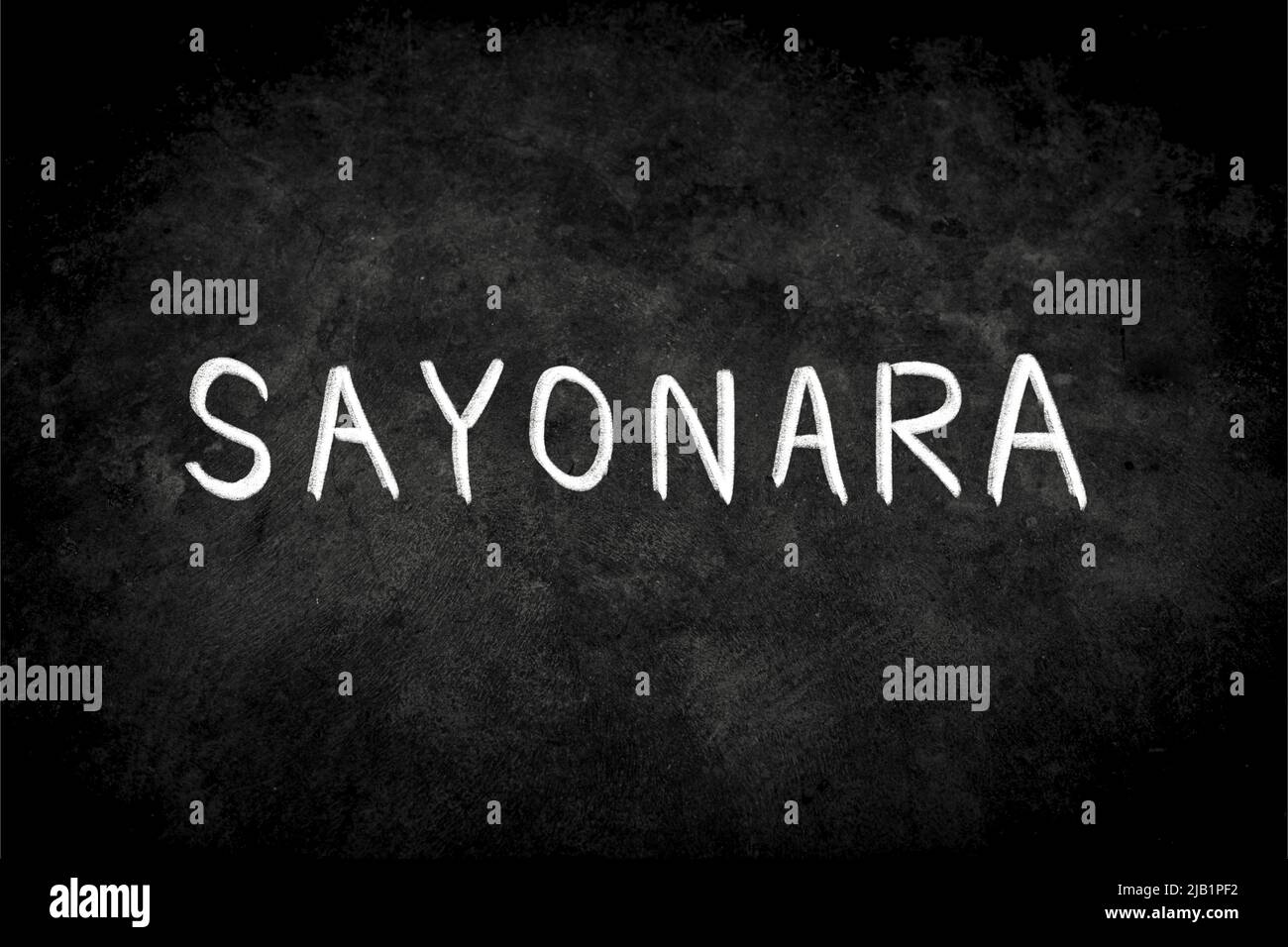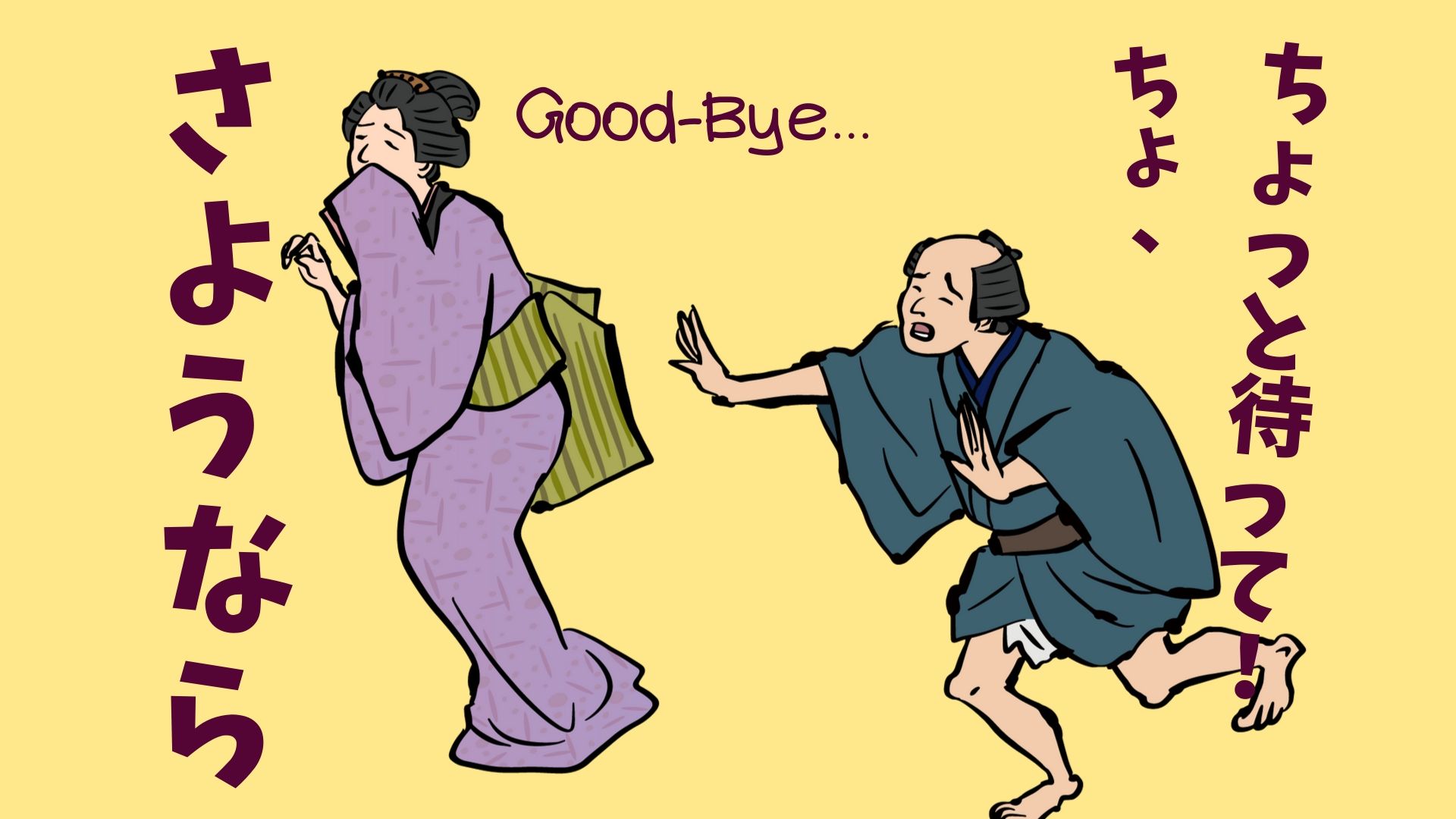Sayonara Meaning - More Than Just Goodbye
Many of us have heard the word "sayonara" and simply think of it as the Japanese way to say "goodbye." It is a word that, for a lot of people, immediately brings to mind a simple parting, like waving to a friend as they leave. However, the true sayonara meaning holds a much deeper, more significant sense than a quick "see you later" or even a "farewell." There's a whole lot more to this word than meets the ear, so it's almost like discovering a hidden layer to a familiar phrase.
The common perception of this word often misses its real heart. In Japan, the word "sayonara" carries a sense of finality, a feeling that a separation might be for a very long time, or perhaps even forever. It's not the sort of word you would typically use for someone you expect to meet again very soon, say, after work or school. That, is that, it implies a separation that could stretch out indefinitely, a parting where a reunion isn't really expected, or at least not in the near future.
Understanding this deeper sayonara meaning can really change how you look at the word. It helps us appreciate the careful way people choose their words in different situations, especially when it comes to saying goodbye. We're going to take a closer look at what "sayonara" truly means, how it's used, and why it's a bit different from what many outside of Japan might think. You know, it's pretty fascinating to see how language can hold so many layers.
Table of Contents
- What's the Real Sayonara Meaning?
- How Do People Use Sayonara Meaning in Japan?
- Sayonara Meaning - Is it Casual or Formal?
- Are There Other Ways to Say Goodbye?
- Understanding the Origin of Sayonara Meaning
- Sayonara Meaning in Everyday Talk
- Sayonara Meaning - A Sense of Ending
- Why Does Sayonara Meaning Feel Different?
What's the Real Sayonara Meaning?
When you first encounter the word "sayonara" (さようなら), it's often explained as a straightforward translation for "goodbye" or "farewell" in English. That's how many language guides start, and it’s what a lot of people carry with them. But, as a matter of fact, if you look at how it’s actually used by people who speak Japanese all the time, you find that its sense is much more profound. It truly means something closer to "farewell forever" or "until we meet again, if it must be so." This isn't just a simple parting of ways; it carries a deep implication of a separation that might not have an end in sight.
Beyond a Simple Farewell - The Deeper Sayonara Meaning
The common thought about sayonara meaning tends to stop at just "goodbye." Yet, in Japanese conversations, it’s not used for everyday partings, like when you leave work or step out of a shop. It is, you know, reserved for those moments when you genuinely do not expect to see someone again, or at least not for a very, very long stretch of time. This makes it a word with a significant emotional weight, a word that signals a more permanent break or a long-term absence. It’s like saying goodbye to a life stage, not just a person for the afternoon.
How Do People Use Sayonara Meaning in Japan?
The way people use "sayonara" in Japan is quite specific, unlike how "goodbye" gets tossed around in English. You won't hear it every day, and that's a key part of its true sayonara meaning. It's not a word for casual departures. Instead, it’s chosen for situations where there’s a real sense of finality or a feeling that the person you're speaking to won't be around for a good while. This makes its use rather rare in daily exchanges, which might surprise someone learning the language for the first time.
When Sayonara Meaning Truly Comes Out
Consider moments when you truly don't anticipate seeing someone again, or at least not for a very, very long time. That is, in some respects, when the true sayonara meaning surfaces. It might be used when someone is moving far away, perhaps to another country, with no clear plans to return. Or, it could be said when you are leaving a situation that you know you will never return to, like quitting a job you truly dislike and have no intention of ever stepping foot in again. The word itself holds the weight of that ending, that long separation.
Sayonara Meaning - Is it Casual or Formal?
It's a bit interesting because "sayonara" is often taught as the Japanese word for goodbye, and in some contexts, it can feel casual, like saying "so long" or "see ya!" in English. However, this casual feeling is often applied to the *sound* of the word rather than its underlying sense of sayonara meaning. While it doesn't carry the strict formality of some other Japanese phrases, its implied permanence means it's not truly casual in the way "bye" is for a quick parting. It's a bit of a paradox, really.
The Casual Side of Sayonara Meaning
Despite its deeper implication of indefinite separation, there are instances where "sayonara" can be used in a way that feels lighter, almost humorous. For instance, you might use it if you're saying goodbye to a truly terrible job at the end of a very long day, expressing a sense of relief and a desire to never return. Or, you could playfully say it to a traveling grandmother who is setting off on a very long trip, knowing you'll miss her but also acknowledging the significant distance and time apart. It’s, like, a way of saying "good riddance" or a heartfelt "until we meet again, whenever that might be," but with a certain personal touch, almost like a sigh of acceptance.
Are There Other Ways to Say Goodbye?
Because "sayonara" carries such a strong sense of finality, people in Japan often use other phrases for everyday goodbyes. There are many ways to express parting, each with its own level of politeness and suitability for different situations. This is why learning about the original sayonara meaning is so helpful, because it points you towards these other options. You know, it's not a one-size-fits-all word at all.
Exploring Alternatives to Sayonara Meaning
If you're just leaving for the day and expect to see someone again soon, you might use phrases like "ittekimasu" (I'm going and coming back) or "itteirasshai" (Please go and come back). For friends, "ja ne" or "mata ne" (see you later) are very common and much more relaxed. These alternatives keep the door open for future meetings, unlike the sayonara meaning which suggests a closing. Understanding these nuances helps you sound more natural and considerate in Japanese conversation, which is pretty important, actually.
Understanding the Origin of Sayonara Meaning
The word "sayonara" doesn't just mean "goodbye" out of nowhere; its deeper sense comes from its very roots. It's derived from a longer phrase, "さようなら (sayounara)," which itself means something like "if it must be so" or "if that is the way it has to be." This origin really helps to explain why the word carries such a strong sense of resignation and finality, a feeling that a separation is unavoidable. It's not a light or cheerful parting, but one accepted with a degree of inevitability, which is, you know, quite profound.
Where Does Sayonara Meaning Come From?
The phrase "if it must be so" truly gets to the core of the sayonara meaning. It implies a situation where a parting is necessary, even if it's not desired. This conveys a sense of accepting a separation, a feeling that circumstances dictate the farewell. So, when someone says "sayonara," they're not just uttering a word; they're expressing an acceptance of a long or permanent parting, a sort of acknowledgment that things are changing and this is how it has to be. It's like saying, "well, this is it," in a way.
Sayonara Meaning in Everyday Talk
While native speakers might sometimes use "sayonara" in a casual, almost humorous way, particularly when referring to Japan in an informal context, it's not a phrase you'll hear often in daily conversation among Japanese people for simple goodbyes. The sayonara meaning truly comes into play when there's a significant departure or a lasting separation. This makes it a word that stands out when it is used, signaling something important has happened or is about to happen. You know, it's not just background noise.
Examples of Sayonara Meaning in Action
To really get a feel for the sayonara meaning, think about situations where you would truly use it. For instance, if you were leaving your home country to live somewhere else for good, you might say "sayonara" to your friends and family at the airport, knowing that future meetings would be rare and difficult. Or, if you finally left a truly terrible job, you might exclaim "sayonara!" to the office building as you walk out the door, expressing a strong desire for that chapter to be completely over. These instances show the word's true weight, that, is that, it's not for a quick trip to the store.
Sayonara Meaning - A Sense of Ending
The core of the sayonara meaning is tied to an indefinite separation, a feeling that a relationship or a period of time is coming to a close without a clear return. It’s a word that carries a sense of finality, unlike many other goodbye phrases that imply a future meeting. This is why it's often introduced as the Japanese word for goodbye but then quickly followed by explanations of its deeper implications. It’s not just a word; it's a statement about the nature of the parting itself, nearly a declaration of an end.
The Weight Behind Sayonara Meaning
When someone says "sayonara," there's a certain weight to it. It's not a light utterance. It suggests that the speaker doesn't expect to see the other person again, or at least not for a very, very long time. This gives the sayonara meaning a rather serious tone, even if the word itself sounds pleasant. It's a verbal acknowledgment of a significant parting, a moment where you are truly saying goodbye to something or someone, knowing that the path ahead is likely separate. It's pretty much a definitive statement.
Why Does Sayonara Meaning Feel Different?
The reason "sayonara" feels different from a simple "goodbye" is rooted in the cultural approach to partings in Japan. While English speakers might use "goodbye" for a wide range of situations, from casual to formal, the Japanese language has a more specific set of phrases for different levels of formality and expectation of return. This makes the sayonara meaning stand out as a particular kind of farewell, one reserved for moments of true, lasting separation. It's, you know, a reflection of how communication works in that culture.
Cultural Nuances of Sayonara Meaning
Understanding the cultural nuances of sayonara meaning is key to using it appropriately. It's not just about the translation of words, but about the feelings and expectations tied to them. The idea of "if it must be so" speaks to a cultural acceptance of circumstances, even difficult ones. So, when "sayonara" is used, it’s often because a situation dictates a long or permanent parting, and the speaker is acknowledging that reality. This makes it a powerful word, one that carries a lot of feeling and a certain kind of acceptance, honestly.

The Real Meaning of “Sayonara” – Why You Shouldn’t Use It

Keyword “Sayonara” by handwriting white coloured chalk on blackboard

How to say ‘See you again’ or ‘Goodbye’ in Japanese? and What does